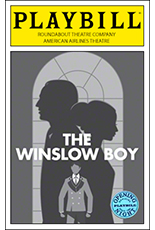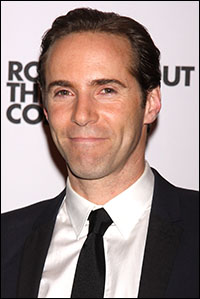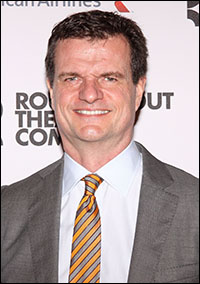
The Winslow Boy, bowing Oct. 17 at the American Airlines Theatre, is an absorbing British courtroom drama Terence Rattigan cleverly concocted without the bloody nuisance of a courtroom and all that "I object!"/"Objection overruled!" nonsense.
The setting is a safe, sedate, civilized Edwardian drawing room in a home in Kensington where the Winslow clan gather to discuss the stain on the family name, brought about when 13-year-old Ronnie is summarily booted out of Naval College for stealing a five-shilling postal order from a fellow cadet. He denies the charge, and his father, Arthur, believes him — to the fanatical degree of throwing the family funds into defending the lad. This means taking on the King of England himself, through a Right to Petition, to get permission to have the boy's case brought to public trial. As Petitions fly, this one flies circuitously through the formal, official courts of law — which takes two years and four acts. With each act, the action seems to be inching toward its day in court, but ultimately it never leaves the day room.
"I think that's what makes the play great," insisted Lindsay Posner, who directed its first London revival London in 20 years and, now, its first Broadway revival ever. "The first time I ever read it, I was expecting there to be a courtroom scene, but, of course, the courtroom drama happens off-stage — apart from that short interrogation scene. That gives you a taste of what's going on, but really Rattigan's preoccupation is with the family and what the trial is doing to the family rather than the trial itself."
The patriarch pushing the case forward — for the most part, on his own — reflects the wear and tear of the ordeal quite conspicuously. His galloping arthritis has taken him from a cane to a wheelchair in two not-so-short two years, and a convalescent home awaits him at trial's end. Daughter Charlotte, a suffragette who smokes and thinks for herself, is asked to forego marriage to a fickle fiancé whose father objects to the public ruckus the family created. Dickie, the older son, is forced to redraw from Oxford, settle for a lesser station in life and take up the family business of banking.
Sir Robert Morton arrives 54 minutes into the play, more like a tsunami than a second wind, and takes charge. The best and most expensive barrister of his day, Morton steps up to the plate to take on the case and the cause, balancing the David-and-Goliath scales. Imperious, parsimonious, pedantic, he strides into the drawing room quite above all, ready to rub up against the hoi polloi when they meet his fee.
The aforementioned interrogation is the best seven minutes in the play. Sir Robert laces into the lad about the alleged crime, grilling him unmercifully and reducing him to tears, while his family watches in helpless horror. Then comes the head-spinning curtain line that leaves the audience deliriously aghast and roaring.
"That scene was why I was dying to do the role," admitted Alessandro Nivola when he met the press in the American Airlines Theatre lobby prior to the Planet Hollywood party. "It's just a gift to an actor, and it has one of the great theatrical twists. I look forward to it every night. It's a really delightful scene and it has a lot of room for a kind of improvisational quality because the character in that moment is being very theatrical, so there's nothing you can do that's too over the top."
It's obvious he understands the character and revels in his swaggering arrogance. "I guess the guy I played in 'Mansfield Park' was of a similar class, but this guy was a really particular social milieu where, class-wise, he is of a higher status than everybody else in the play," the actor said. "Although the family the story is about is a middle-class family and well educated and well spoken, this guy is an aristocrat. There had to be a feeling that on some level he was both frightening to them and impressive, like a film star for today, and someone they were all intimidated by. He himself felt like he was slumming it by having to spend so much time with them, and yet of course he falls in love with the daughter of the family and ends up getting all emotionally involved with their cause, despite his better judgment."

Buy this Limited Collector's Edition |
Sir Robert, who is based on Sir Thomas Carson, the King's Counsel who vigorously prosecuted Oscar Wilde, is now obviously the piece de resistance of the play, but it wasn't always. Alec Guinness, for whom Rattigan wrote the role, turned it down because of its brevity, as did Eric Portman, leaving it to Emlyn Williams to originate in the 1946 London production. Frank Allenby, a workaday actor in his only Broadway appearance, introduced Sir Robert to New York — although some effort was made to throw a Hollywood name on the Broadway marquee. Clive Brook declined, noting the father and the daughter had bigger roles than the lawyer. Then, Robert Donat was asked (it would have been his only Broadway performance), but he thought the role too small. He thought again for the 1948 movie when Alexander Korda offered him a tidy sum and top billing, and the courtroom scenes that the play scrupulously avoided were written into the film to beef up his role. Cedric Hardwicke and Margaret Leighton, who did the heavier-lifting in the film, followed in billing.
Another American reclaimed from England is Mary Elizabeth Mastrantonio, who plays the Winslow matriarch, Grace. She began her career at The Public Theater and, after a couple of decades in London, returned to New York two years ago. "Sometimes, the Roundabout reminds me a bit of The Public in that it's a very thriving infrastructure that's there to look after and protect the whole process, so I'm comfortable here."
 |
||
| Alessandro Nivola |
||
| Photo by Joseph Marzullo/WENN |
Director Posner said the thing he was proudest of with this production was "the company chemistry. The whole ensemble is playing with the rhythm and the beauty of the piece very well indeed. A great achievement is that they managed to find a sense of Britishness about it, which is a typical thing just as odd as it is for British actors to find what is quintessentially American in American plays, and I think they really pulled it off. I do feel I'm watching a British play when I'm watching it."
What does he want American audiences to take home from the play? "I hope they feel uplifted in the way Arthur Winslow has stood up against the establishment and persevered and won a cause based on right. In that sense, it speaks very clearly to Rattigan's period and now. I also think audiences will be moved by the complexities of the family dynamics, which are very accessible and beautifully written."
Roger Rees, who stars as the determined patriarch, plays the part without a whiff of sentimentality, and that was the way Posner wanted it. "I was very keen that he didn't. I think it's all the more moving for that reason. I think if you start playing that part for sympathy the play becomes sentimental in the wrong way and a bit flabby."
Rees has seen the play a lot and is following some of his favorite actors in the role (including Nigel Hawthorne, who did it in David Mamet's movie remake). "I love the role. You have to love the characters you play. If you're playing Iago, you love Iago." Born in Wales, Rees has been a regular in New York theatre since he won the Tony for the title character in The Life and Adventures of Nicholas Nickleby in 1981. Charlotte Parry is a Brit who has been based in New York for eight years and very well used by Roundabout in British plays like The Importance of Being Earnest, Look Back in Anger, Howard Katz and now this. "Oh, I love playing Catherine," she admitted. "She's very headstrong, very passionate, very ahead of her time — a suffragette feminist. They refer to her as 'the new woman.' She's so complicated, and I love she's written so strong and witty and, at the same time, she has a sensitive side and is feeling so much. I don't feel people write characters like that very often.
"Rattigan makes it so easy to (a) learn the lines and (b) play them because he got each character down so individual and so right. He's just an actor's playwright."
 |
||
| Michael Cumpsty |
||
| Photo by Joseph Marzullo/WENN |
Stiff and stuffy, Cumpsty has a playfully poignant proposal scene and later, in the press reception line, he said he thinks it did the trick. "I think he gets the girl. I think she marries him. Of course, she won't be very fulfilled, but I'll be very happy."
Zachary Booth as the older Winslow brother knows his place in the play. "I think I'm one of the examples of what the cost does to the family. I'm in Oxford, and I'm derailed, unceremoniously removed. I'm forced to grow up a little bit due to the financial restraints that come as a result of the case. It's the amount of money they spend on getting the best lawyer. It costs the family quite a bit, but I like Dickie in the end. He comes back. He's working hard. He's going to join the Army."
The dark clouds of World War I are gathering in the distance, and they would claim the real Winslow boy, George Archer-Shee, four short years after the play's end.
Spencer Davis Milford, newly turned 18 and making his Broadway debut in the title role, was dealing with this milestone on opening night. "It feels amazing. There's a big rush of energy going through me right now. It's very exciting. It's been an incredible experience working with such accomplished actors. I've learned a lot." Admirers of "the well-made play," of which Rattigan was the acknowledged master — themselves practitioners — headed the list of first-nighters: Neil Simon, Adam Gwon, John Weidman and Rick Elice.
Lyricist Sheldon Harnick and wife Margery had a double reason for attending: (1} Rees is a neighbor of theirs on the Upper West Side and (2) Lindsay Posner directed a London revival of Fiddler on the Roof, starring Henry Goodman (who did Rees' role in Posner's The Winslow Boy earlier this year in London) playing Tevya.
"What was that guy's name again? Lindsay Lohan?" the lyricist teased.
Encompass New Opera Theatre is throwing Harnick a 90th birthday party (six months early) on Sunday, Oct. 27, at The National Arts Club. In addition to "Happy Birthday," a host of Harnick evergreens will be reprised by a pretty starry ensemble.
And York Theatre Company's Musical in Mufti series will be parading five Harnick nuggets in a row after the first of the year: Sheldon Harnick: A World to Win (Jan. 17-18), Dragons (Jan. 31-Feb. 2), Malpractice Makes Perfect (Feb. 14-16), Smiling, the Boy Fell Dead (Feb. 21-23) and Tenderloin (March 7-9).
Other first-nighters: Alexandra Silber, Andrew Rannells (mustachioed!), Carolyn McCormick, David Zippel, Dick Scanlan, director Evan Cabnet (basking in his The Model Apartment raves), Chris Bauer, Christian Borle, Constance Shulman, Reed Birney and Margaret Colin (soon to be seen in Manhattan Theatre Club's Taking Care of Baby), Seth Numrich, director-choreographer Rob Ashford, Victor Garber and, from "The Newsroom," Mrs. Alessandro Nivola: Emily Mortimer.





































































